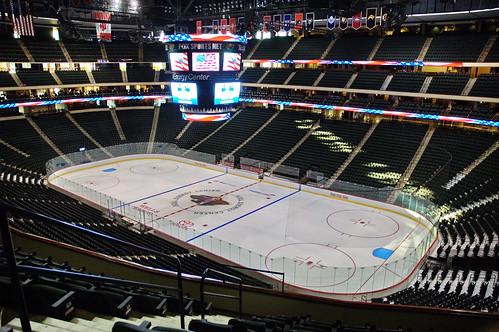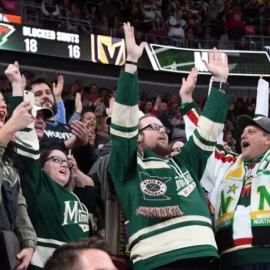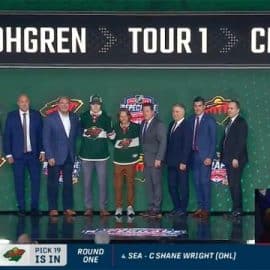1920’s movie star Mary Pickford once said, “If you have made mistakes, even serious ones, there is always another chance for you. What we call failure is not the falling down but the staying down.” Sage advice from one of the most significant stars in early film. Second chances are a part of life. More often than not, when you make a mistake you get a chance to prove yourself again and make amends. For those of us who are unafraid to admit they’ve made mistakes after the initial pain of making such a mistake wears off the first thing one thinks of is when they will have the opportunity to rectify the situation. I am fairly certain that is what the City of Winnipeg is feeling right now after it has been announced that the NHL’s Atlanta Thrashers have been sold to True North Sports & Entertainment, an ownership group based out of the sprawling city on the Manitoba plains. I can relate as I can say much of those feelings of wanting to prove one’s self to the doubters when the NHL returned to Minnesota in 2000. In 1997 the NHL announced the approval of a new expansion franchise and we knew we’d have our second chance to prove the Twin Cities is a great market for the league.
Yet the final redemption of being granted a new franchise in 1997 was not without attempts to try to expedite that process. What is often forgotten was Minnesota’s attempts to attract teams that were going through relocation; which was a bit of a fad throughout the mid-1990’s as it started with the painful move of the Minnesota North Stars to Dallas. Yet soon after the North Stars left in 1993, many hockey fans their wealthy hockey-mad compatriots tried to be a part of the bidding war for other NHL franchises who wanted to seek out new pastures. The state tried to lure the Quebec Nordiques (who left for Colorado), the Hartford Whalers (who left for North Carolina), the Edmonton Oilers (who didn’t go anywhere), and ironically enough the Winnipeg Jets (who left for Phoenix) as well only to fail in each attempt. In a strange twist, it was soon after the failed attempt to land the Winnipeg Jets (no pun intended) that Minnesota would lose its consolation prize; of an International Hockey League franchise the Minnesota Moose which would go to Winnipeg where they became the Manitoba Moose. The old slogan for the departed IHL squad was “the Moose was loose” could not be more accurate. The NHL toyed with Minnesota during the 7-year hiatus between the North Stars relocation and the arrival of the Wild with a few exhibition games played at the Target Center in Minneapolis. Not that this needs anymore irony but recent discussion about shutting down the Target Center and having the Timberwolves take up residence in St. Paul’s Xcel Energy Center makes this whole story seem to come full circle. Yet the bigger question about this most recent franchise relocation that I feel is not being asked nearly enough, is this a real good idea for the NHL?
Click on “Read More” to see the rest of the article…
Should Winnipeg have been the first Canadian city considered for franchise relocation? Perhaps not. On the outside it is tough to be too critical about relocating a struggling franchise from a non-traditional Southern market to a ‘hockey-mad’ Canadian city. Especially to a city that once supported NHL hockey before. Afterall, second chances are something to be expected right? So why am I doubting the wisdom of moving the Thrashers to Winnipeg? So here are some reasons to consider about why Winnipeg may not be the ideal place to relocate.
1. MTS Center is not up to NHL standards: Not to sound mean, but Winnipeg’s MTS Center is insufficient without a massive overhaul to be the home of NHL hockey. The capacity would be the lowest in the NHL at a scant 15,015; which is over a thousand fans less than the league’s next smallest arena the Nassau Veteran’s Coliseum in Uniondale (home the New York Islanders) at 16,234. A few years ago I went to a Manitoba Moose game and by NHL standards the concourses are very cramped. Even with just over 7,000 fans at the game it was congested and I can’t imagine how bad it would be with another 8,000 fans in the building. Hardly a fun or fan-friendly experience and let’s face it the Winnipeg franchise will need to do all it can to keep the fans packing the place if they’re going to be financially viable. It has been stated the MTS Center was designed with expansion in mind, but take a look at this picture? As it is, the fans are right underneath the rafters, how much higher can you go? Also one can hardly go without noticing the fact MTS Center has just one area of premium seating (i.e. executive boxes). Maybe I’m being old fashioned but didn’t former North Stars owner Norm Green say he couldn’t compete financially because the Met Center lacked enough room for executive suites that any sports team will tell you is where the big money is made. So how can this new franchise truly be able to compete with less seats than the Met Center and few suites and premium seating that NHL owners have long since been touting as essential to being able to make ends meet. All one has to remember is what Pittsburgh stated about how crucially important it was to have a new arena in order to be competitive and it took the selection of Sidney Crosby via the draft and a favorable deal from the city to end the years of gridlock otherwise the Penguins would’ve relocated. Or the more recent struggle between the New York Islanders, the city of Uniondale and team owner Charles Wang. Wang has been waiting nearly 10 years for a significant upgrade or a new arena altogether and has been talking about relocation more and more as those talks have stalled. This proves that seats, arena immenities certainly do matter to being financially viable in today’s NHL. Look at the pictures of MTS Center and St. Paul’s Xcel Energy Center which really has become the standard for new arenas since it was finished in 2000. Don’t forget MTS Center only opened in 2004, so its not like its an old building the city is looking to replace and it would seem rather foolish to construct a completely new facility when you have such a new (albeit undersized) arena in place. Just to put it into perspective, if they were to sellout every game at MTS Center, the team would be ranked 26th in the league in attendance. As team revenues are so tied to attendance, having the least amount of seats puts any organization at a distinct disadvantage. Obviously, it would limit True North Sports & Entertainment’s ability to fully capitalize on the popularity of their franchise.
Just compare the MTS Center (above) to the Xcel Energy Center (below)
Or how about we compare a suite at the MTS Center (above) with the Xcel Energy Center (below)
2. It is a slippery slope to say strong AHL attendance will translate to NHL attendance: One reason that is commonly stated about moving NHL teams; is that Winnipeg has had strong attendance for their AHL team as a justification there is enough interest in an NHL team. While I have little doubt there is a significant portion of hockey fans in Winnipeg that would love to see the NHL return are they really prepared for what that means for their pocketbook? Instead of paying $33.60 for a nice lower bowl seat behind the bench, they’d be asked to pay $95 for the same seat. That is a pretty significant difference. Season ticket prices would also see a huge increase from the more family-friendly AHL prices of $1,544 for a 40-game ticket package at those same seats behind the bench; compared to $3,485 for 41-games before taxes. Even NHL fans know that most of the middle & working class fans populate the upper deck while the upper class and companies populate the lower bowl. Will those middle & working class fans want to sit up in the nose bleeds just because its NHL hockey or will they miss the better bargain AHL tickets provided them? Remember, Winnipeg is most likely not getting the made-for-success Quebec / Colorado scenario here. Also, if corporate sponsors help buy up the more expensive lower bowl seats which city has more corporations to draw from; Atlanta or Winnipeg. Atlanta may be in the sunbelt but it is the most important economic center of the southeastern United States.
3. NHL’ers are letting their agents know, they don’t want to play for Winnipeg: At least that is what former NHL’er Glenn Healy thinks. A few players like Calgary’s David Moss have stated that if Winnipeg was to create a winner it would likely become a destination but that seems to be a minority opinion. A poll done by the NHLPA only had 25% of its membership say they felt Winnipeg would be a good place for a team to relocate to. That’s hardly a glowing endorsement. In fact, in many ways there seems to be a stigma about the city’s harsh winter climate much in the same way players seem to recoil at the thought of playing in Edmonton. Although some have noted that when the Oilers were winning Stanley Cups during their glory days of the late 1980’s anyone would’ve gladly gone to Edmonton to play but that’s easier said than done. Unless the team somehow manages to win on its own and change its fortunes it will likely be tough to attract free agents to the Thrashers’ (or whatever they’ll end up being called) new city. One perk of playing hockey in a non-traditional (i.e. sunbelt) market is that off of the ice you can enjoy the nice weather and also live in relative anonymity. That will not be the case at all in Winnipeg where they will be in the media fishbowl that goes with playing in a Canadian city. All one has to think of is Chris Pronger demanding a trade just after helping lead Edmonton to the Stanley Cup finals simply because he didn’t want to live there. Edmonton has been jilted multiple times since by Michael Nylander, Dany Heatley and Marian Hossa and it is very likely Winnipeg could also be given the cold shoulder by some of the league’s premier stars.
So where should the NHL have relocated first? Quebec City. It certainly was the players choice; as the NHLPA poll I cited earlier had Quebec City as the frontrunner with 53% of the vote. The obvious drawback is that the league would’ve have had to wait a few years before the city built their new arena but having an NHL-ready arena is really what is ideal for relocation not trying to hold on in a building not suitable to yield profits right away. Quebec’s provincial government seems much more apt to help out and its fans have made their presence felt by traveling to a number of American markets to show they are willing to travel too. Have we seen Winnipeg fans show up in droves like these Quebec fans did in Long Island? Quebec would have to build a new arena as Colisee Pepsi is old and not nearly up to par but even that arena has more seats than the MTS Center. Yet Quebec has practically stated if a team is to be relocated there that construction would begin on a new arena almost immediately. With a brand new home for the relocating team to arrive to is the ideal situation.
I am not saying that NHL is going to fail in Winnipeg a 2nd time the way it did in Atlanta. In fact, growing up in a hockey fanatic market like Minnesota we all know how great a second chance can be. Yet, my main premise is that relocation from Atlanta to Winnipeg will have some pressing issues to address right from the start. A massive reconfiguring of MTS Center will be necessary to make it a viable NHL arena. I certainly believe Winnipeg fans will be loyal and fanatical, but unless they can show some success on the ice I think they may wish they had the far more affordable Moose back. So far there has been nothing said of what is to become of the Manitoba Moose which have been an excellent AHL success story to this point.
I hope the NHL does succeed in Winnipeg where it clearly failed in Atlanta. Not to pat myself on the back too much; but the fanbase that I rated the worst in the NHL for the last two years as part of my Best and Worst Fans of the NHL series of articles was Atlanta and in a sad testament to the truth of my ranking just over 200 fans showed up for their ‘Save the Thrashers’ rally. I rated the Coyotes 29th, should they be worried? We shall see although they seem to be safe in the desert for one more season at least.
Add The Sports Daily to your Google News Feed!












